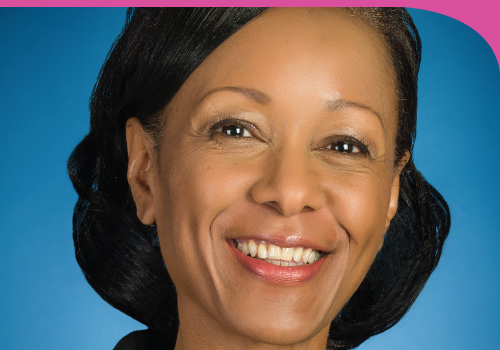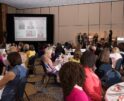
Anita Phillips: Ready for Ready
“It is the discontent, unreasonable person who creates change,” Anita Phillips, Senior Director of Strategic Consumer Insights, RJ Reynolds, tells PINK, who sometimes wonders what her life would have been like behind a white jacket.
Phillips spent her undergraduate years studying chemistry, with lifelong plans of becoming a dentist and running her own private practice.
“Over the course of my college years, I can’t begin to recount the number of discouraging messages I received,” she says, “A dentist told me stories of the biases women face in medical school; others reminded me of the realities of student loan debt and trying to secure financing for a private practice.”
“Ultimately, I compromised and pursued a less risky route,” admits Phillips.
But, she doesn’t regret her decision. Science and technology careers were beginning to open up for black women at the time, and she’s been privileged with “exceptional experiences” and opportunity for upward mobility. Her tenure with the company began as a chemist in the Research and Development department and, being one of few women in STEM, Phillips agrees there is still room for improvement when it comes to advancing minority women into leadership positions.
In a candid interview with PINK, Phillips tells us what she thinks women can do to help their own cause, how she stays “ready for ready” and the four things she believes women should know before entering the business world.
Little PINK Book: What led you to the tobacco industry?
Anita Phillips: I am a Winston-Salem native and third-generation R.J. Reynolds employee; my grandmother worked in the original downtown Winston-Salem factories and my father, a facilities electrician retired more than 15 years ago. The company represents more than a job for me; it is part of my culture and in some respects a way of life.
LPB: How did you land your first big job?
AP: I joined RJ Reynolds in 1985 as a chemist in its Research and Development Department to work in an innovation space focused on new to the world technologies. Successful efforts in this area opened the door to opportunities from product design to business analysis.
When opportunities arise, you must be ready to seize them, not unprepared or too terrified to try.
When the role [Senior Director, Strategic Consumer Insights] became available several years ago, I was on a short list for it, but I was disappointed when I didn’t get the position. My most staunch advocates rallied around me, guided me through disappointment, encouraged optimism, and most importantly, counseled me on how to be “ready for ready” next time. A few short years later, I was up for the position again and secured it. Had I let disappointment turn into negativity, the outcome would have been just that, negative.
LPB: What does it mean to be “ready for ready?”
AP: I have two young adult daughters and they have heard “be ready for ready” ad nauseam. When opportunities arise, you must be ready to seize them, not unprepared or too terrified to try. Proficiency takes time and you have to dedicate yourself to achieving it. Know your space and subject matter better than anyone else, but also exercise forward-thinking, stretch yourself to learn more about the space that you want to achieve.
At one point in my career, I was offered an opportunity to move from an R&D role into Marketing Research because my knowledge, work efforts, and network had started to grow into the space – I was prepared.
LPB: Do you have any other mantras?
AP: Face your fear – which works hand-in-glove with “ready for ready.” For me, the fear was always not being prepared well enough, not knowing every detail about a subject matter. But some time ago, I came to realize and respect that I could never be completely prepared and know everything – I’m human, not superhuman. Being comfortable with my limitations, short-comings and flaws, accepting and owning them, was actually self-assuring.
There is tremendous confidence to be gained in being authentic, comfortable in your own skin and respecting that we are all human, still evolving, growing, and getting better.
LPB: What role have mentors played in your success?
Homework doesn’t stop once you’ve graduated from school…
AP: I’ve had several mentors throughout the years, incredible folks who took an interest in my aspirations and helped me to grow towards them. “Be coachable” is probably the best and most memorable kernel of advice that I’ve received.
It speaks to a willingness to accept performance or competency gaps that might impede your growth to leadership, having the desire to improve on them, and a willingness step outside of your comfort zone. Opening up to coaching helped me to uncover and address blind spots, changing my trajectory to the positive.
LPB: What advice do you have for women entering the business world?
AP: Get out of your head and your own way. Those critical voices in your head, messages of “can’t do” and “self-doubt” will side rail you every time. No matter what, encourage yourself with positive, motivating messages of “can do” and surround yourself with uplifting, positive folks.
Stay current. Read, read, read – be up to speed on trends that are shaping society and creating business opportunities. Homework doesn’t stop once you’ve graduated from school; businesses expect employees to come in each day with a certain level of social knowledge and preparedness.
Speak Up. Speaking up is not necessarily something that comes easily for me; I was rewarded for being polite, disciplined, and getting along. I’m inspired by and learn from the younger women coming along today who are so much better at this than me, but there is still opportunity for growth even among them. Develop and have confidence in your point of view and don’t shy away from sharing it.
Dress the part. Celebrate and embrace your sense of style, be your authentic self, but respect that you are an agent of a company or a brand, which has its own image that it is trying to project. Understand the standards so that the conversations about you are centered around what you contribute versus how you dress.
By L. Nicole Williams
Recommended
-
Do You Have The Imposter Syndr...June 18th, 2022
-
1 Key Email Marketing Tips For...January 6th, 2022
-
Six Tips For Choosing A PEO Se...September 20th, 2021
-
Top Women Profiles, PINK Lists...July 20th, 2021
-
Black Lives Matter. PINK Stand...June 15th, 2020















